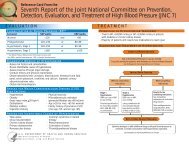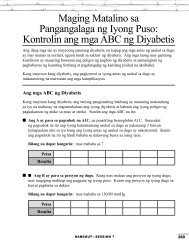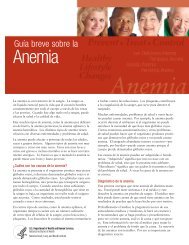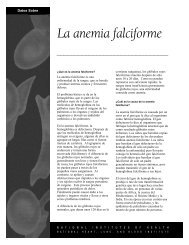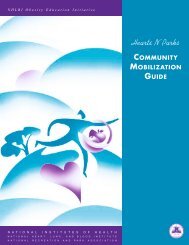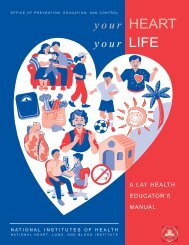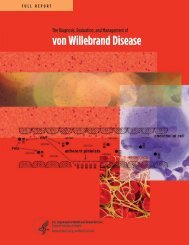WOMEN 'S HEALTH AND MENOPAUSE : - National Heart, Lung ...
WOMEN 'S HEALTH AND MENOPAUSE : - National Heart, Lung ...
WOMEN 'S HEALTH AND MENOPAUSE : - National Heart, Lung ...
You also want an ePaper? Increase the reach of your titles
YUMPU automatically turns print PDFs into web optimized ePapers that Google loves.
CHAPTER 13: BEST CLINICAL PRACTICES:<br />
The proportion of women living past the age of<br />
menopause has tripled during the past century, and<br />
is expected to increase steadily in the foreseeable<br />
future. If adulthood is defined as beginning at age 21,<br />
the average age at menopause as age 51, and the<br />
average life expectancy as age 81, women in the<br />
United States, in Europe, and in much of the developed<br />
world will live one-half their adult lives in the<br />
years after menopause, a time of relative estrogen<br />
deficiency compared to their reproductive years.<br />
In recent years, the aging of the female population,<br />
together with the availability of “replacement”<br />
hormones, led to numerous studies of the menopause.<br />
Most of these studies were of middle-class<br />
white women living in the United States and<br />
Western Europe, with results that may not be rele-<br />
ACOMPREHENSIVE APPROACH<br />
Elizabeth Barrett-Connor, M.D.;* Susan Hendrix, D.O.; † Bruce Ettinger, M.D. ‡<br />
Nanette K. Wenger, M.D. Chair; Rodolfo Paoletti, M.D., Cochair; Claude J. M. Lenfant, M.D., Cochair; Vivian W. Pinn,<br />
M.D., Cochair<br />
Panel: Martin H. Birkhäuser, M.D.; Louise A. Brinton, Ph.D.; Aila Collins, Ph.D.; Peter Collins, M.D.; Pier Giorgio<br />
Crosignani, M.D.; Lorraine Dennerstein, A.O., M.B.B.S., Ph.D., D.P.M., F.R.A.N.Z.C.P.; Jan-Åke Gustafsson, M.D., Ph.D.;<br />
Victor W. Henderson, M.D., M.S.; Carlo La Vecchia, M.D.; Robert Lindsay, Ph.D.; Adriana Maggi, Ph.D.; Joan A.<br />
McGowan, Ph.D.; Anne McTiernan, M.D., Ph.D.; Maryann Redford, D.D.S., M.P.H.; Susan M. Resnick, Ph.D.; Jacques E.<br />
Rossouw, M.D.; Sherry Sherman, Ph.D.<br />
1. INTRODUCTION<br />
vant to other women. In addition, many studies<br />
were clinical or epidemiological observations of<br />
associations—less satisfactory for evidence-based<br />
medicine than randomized, placebo-controlled,<br />
double-blind clinical trials. Results from recent<br />
clinical trials studying the benefits of HRT have<br />
differed from observational studies. Results from<br />
additional large clinical trials, expected in the next<br />
5 years, may further change thinking about the<br />
optimal management for the menopausal woman.<br />
The menopause offers the health care provider an<br />
opportunity to assess each woman’s health, her<br />
concerns, and the need for health promotion and<br />
disease prevention measures. Today’s health care<br />
provider has to consider a bewildering array of<br />
changing “facts” and sees increasingly informed<br />
* From the Division of Epidemiology, Department of Family and Preventive Medicine, UCSD School of Medicine, La Jolla, CA, U.S.A.<br />
† From the Division of Gynecology, Department of Obstetrics and Gynecology, Wayne State University School of Medicine, Hutzel Hospital, Detroit,<br />
MI, U.S.A.<br />
‡ From the Division of Research, Kaiser Permanente Medical Care Program, Oakland, CA, U.S.A.<br />
271



